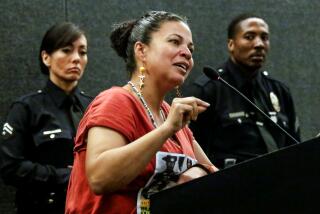Abu-Jamal Case: The Might and the Limits of the Press
For years, there was relatively little news about the case outside of Philadelphia. But recent weeks have found Mumia Abu-Jamal, who is facing death by lethal injection for the 1981 murder of a Philadelphia police officer, drawing a media spotlight. One that has widened in August.
“I see this man’s face everywhere,” slain Officer Daniel Faulkner’s widow, Maureen, lamented stonily on ABC’s “Good Morning, America” Wednesday. An eloquent Philadelphia radio reporter who had been moonlighting as a cabbie, Abu-Jamal was convicted by a jury in 1982 of fatally shooting Faukner one night after witnessing the officer hitting Abu-Jamal’s brother with a flashlight while seeking to arrest him.
Some of Abu-Jamal’s supporters argue that he was framed by law enforcement officials because of his support for black-nationalist causes and that the real gunman fled the scene. Most supporting his quest for a new trial do not maintain that he is necessarily innocent, only that justice demands that he receive another day in court.
Alternative media have always shown the most interest in Abu-Jamal’s campaign for a new trial. For example, “The 90s Channel,” a mini-network from Boulder, Colo.-based, Free Speech TV whose small chunks of programming surface mostly on leased-access cable in local communities, all this week has been running only documentaries in support of Abu-Jamal.
It’s mainstream media that carry wallop, though. And their recent attention to Abu-Jamal and his scheduled Aug. 17 execution date may have helped save his life, at least temporarily.
On Monday, he was granted an indefinite stay of execution by Judge Albert F. Sabo. It was Sabo who presided over Abu-Jamal’s 1982 trial, which his lawyers and supporters insist was grossly unfair. It was Sabo, also, who only last week--before the latest crush of stories on the burgeoning crusade to earn Abu-Jamal a new trial--had declined to grant the long-time Pennsylvania Death Row resident a stay.
When granting the stay Monday, Sabo said he was doing so to allow time for completion of an ongoing hearing to look at whether Abu-Jamal deserves a new trial. Abu-Jamal has an “absolute right” to be heard by the U.S. Supreme Court, added Sabo, surely in anticipation of new appeals being filed should he deny Abu-Jamal’s request for a new trial.
But why this apparent change of tone by a jurist accused by Abu-Jamal supporters of bias in the courtroom and of openly expressing contempt for them? Does it reflect some sort of epiphany regarding the law? Or was Sabo influenced, at least in part, by swelling protests from grass-roots activists and other Abu-Jamal supporters (who include influential celebrities, literary figures and academicians)? They have conveyed their feelings by fax, phone and mail and, significantly, via some of the national press and television’s Very Important Programs.
“Sabo was absolutely pressured into granting the stay,” said Fred Horstman, a New York administrator for the highly active Committee to Save Mumia Abu-Jamal.
If so, in tandem with a much larger story--daily coverage of the tangled, bloody conflict raging in the former Yugoslavia--Abu-Jamal coverage would offer a persuasive primer on both the might and the limits of the media.
First, the limits.
Never before, perhaps, have newspapers and newscasts been so relentlessly awash with vivid images of human misery as they have in their reporting of the seemingly widening carnage in the former Yugoslavia. Yet story after story and TV picture after TV picture of innocent civilians slain, wounded or rendered homeless in the ever-lethal Balkans conflict have produced resigned sighs and head-shaking, but seemingly no public groundswell for direct U.S. intercession there.
Perhaps this constant exposure has desensitized Americans to the overseas suffering they are witnessing. Perhaps our brains have space for only so many negative impressions. After awhile, one set of victims may look pretty much like another, all of them congealing into a single goo of memory.
Perhaps numerous media retrospectives about the cessation of World War II have hardened resistance, 50 years later, to sacrificing still more U.S. lives in Europe on behalf of some vague, ill-defined do-gooder cause.
Perhaps the fluidity of the conflict is too disorienting, as recent shifts of power in Croatia, for example, have found the oppressed and the oppressors appearing to have switched roles. Or perhaps the region’s history is too Machiavellian, its traditional nationalist intrigues too intricate, its trail of victims too long and too distant to comprehend from afar.
Even when the casualties are personalized--as in “Romeo and Juliet in Sarajevo,” Tuesday’s poignant “Frontline” documentary on PBS that chronicled the lives and deaths of young lovers seeking to marry in 1993--deep feeling produced by powerful pictures and words ultimately gives way to abstraction. The next day their fates seem as remote as the sniper who picked them off.
But there is nothing remote about Abu-Jamal, a lone, dreadlocked African American painted by his supporters as being at once a metaphor for injustice in the U.S. and a casualty of a legal system increasingly under attack. This our brains can accommodate. Easy to grasp and replete with an easily identifiable alleged villain in Sabo and an easily identifiable alleged victim in Abu-Jamal, here is something that can not only drive emotions but also channel them into a course of action.
Whether Abu-Jamal deserves a new trial, or whether the only true victim here is Faulkner is for others to decide. In any case, the media are absolutely correct in calling attention to Abu-Jamal’s Odyssey.
More to Read
Sign up for Essential California
The most important California stories and recommendations in your inbox every morning.
You may occasionally receive promotional content from the Los Angeles Times.










